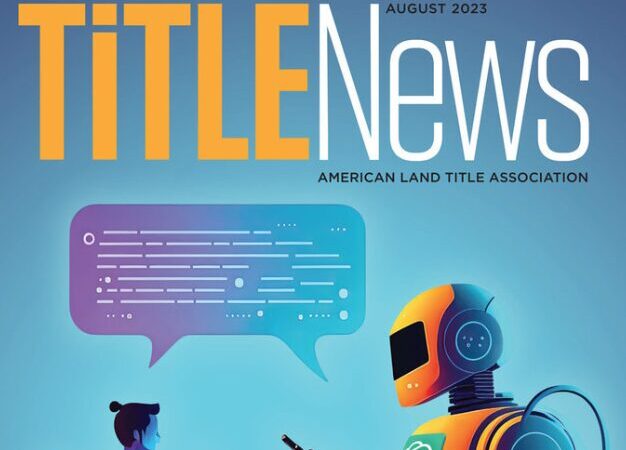ChatGPT has become a topic of conversation in the title and real estate industry. While many see the benefits of the artificial intelligence (AI) chatbot, others call attention to the drawbacks.
Among the advantages of ChatGPT is the ability to generate content quickly with minimal effort. On the flip side, potential risks of the natural language processing tool include plagiarism, security, privacy and bias.
The pros and cons of ChatGPT, which was released in November 2022 by OpenAI, were the focus of a recent discussion on ALTA Connection.
Anton Tonev, co-founder of InspectHOA, loves ChatGPT and has been using it every day for the past few months.
“It is a great time saver for almost everything that I write—from emails to presentations,” he said. “If you learn how to use it—not just ask generic questions—I don’t see how you would ever go back. It is like having an extremely smart colleague, or better yet, like a huge team of extremely smart colleagues.”
Cheryl Evans of Wicked Title Forum said it’s helpful to draft content for social media posts, ad copy, emails, articles and blog posts. While it creates the content quickly, Evans said it’s important to read what the chatbot generates to correct any mistakes and “make it sound like you.”
“While it feels like talking to a person, it’s not,” Evans said. “You’re talking to a machine. The quality of your input determines the quality of your output. So if you aren’t getting the results you want, it’s not because ChatGPT is bad, it’s because the prompt is wrong. Writing a good prompt is more of an art form than it is a science.”
Andy White, co-founder and CEO of Closinglock, agreed it’s a useful tool and uses it to create a range of things from drafts of documents to generating business analytics queries. However, his main concern with ChatGPT and similar platforms is the risk exposing proprietary of sensitive information.
White posted several items that cause him concern, including:
- Bias: ChatGPT is trained on a massive data set of text and code, which means that it can reflect the biases that are present in that data. This can lead to ChatGPT generating text that is offensive, harmful or discriminatory.
- Misinformation: ChatGPT can be used to generate text that is factually incorrect or misleading. This can be used to spread misinformation or propaganda.
- Privacy: ChatGPT is trained on large amounts of data, which can include personal information. This data could be used to track or identify users.
- Security: ChatGPT could be used to create malicious software or to attack computer systems.
“It is important to be aware of the risks associated with ChatGPT and to take steps to mitigate them,” White said. “This includes using ChatGPT responsibly and being aware of the potential for bias, misinformation, privacy and security risks.”
To mitigate these risks, don’t share personal information with ChatGPT, don’t use it to access sensitive data, don’t assume everything it creates is accurate and be aware of text that could be harmful.
“By following these tips, you can help to mitigate the risks of ChatGPT and use it safely and responsibly,” White added.
Sabrina Bier, director of digital media and education at Proper Title, sees the AI chatbot as a powerful tool that can provide benefits that companies are still just beginning to leverage
As an example, she shared the results of a question she posed to ChatGPT:
“What are the top ways for a title company to brand themselves so that Realtors will choose to work with them consistently?”
ChatGPT generated a bulleted list. Bier then asked the chatbot to create a blog post about the second bullet point.
“What it generates is an awesome guide, but you need to edit it to fit your company, brand, market and expertise,” Bier said. “With that said, it saves so much time.”
She also noted that the information doesn’t contain citations, so users must perform their own due diligence to ensure the content is factual.
Cathy Clamp CTIP, NTP, an escrow officer at Heart of Texas Title Co. LLC, also agreed ChatGPT can be a useful and timesaving tool to draft preliminary documents and complicated explanations of title issues.
“Phrasing requirements in a way that is nonthreatening and encouraging to stubborn heirs or warring neighbors can be challenging and (ChatGPT) would be a useful aid,” Clamp said.
But as a content creator, however, she’s largely concerned with plagiarism.

